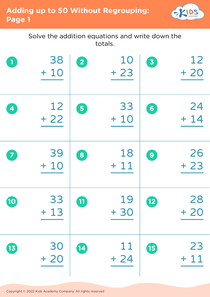Understanding symmetry Adding up to 50 with Regrouping Worksheets for Ages 5-7
4 filtered results
-
From - To
Explore the engaging "Understanding Symmetry Adding Up to 50 with Regrouping Worksheets" specifically designed for children aged 5-7! These worksheets make learning both math and symmetry fun and interactive. Through colorful activities and exercises, young learners will grasp the concepts of addition while mastering regrouping strategies. The focus on symmetry reinforces spatial awareness and encourages creativity. Ideal for home or classroom use, these worksheets support your child’s foundational math skills, helping them build confidence in solving addition problems that total up to 50. Spark a love for math and symmetry with these educational tools that make learning exciting! Perfect for early grade teachers!
Understanding symmetry and the concept of regrouping while adding up to 50 are essential skills for children aged 5-7. Parents and teachers should care about these concepts because they lay the groundwork for critical thinking and problem-solving abilities.
Firstly, symmetry fosters spatial awareness. Recognizing symmetrical patterns helps children understand relationships and structures in mathematics and nature, enhancing their overall cognitive development. As children observe and create symmetrical shapes, they develop fine motor skills and an artistic appreciation, which are vital for holistic learning.
On the other hand, regrouping when adding reinforces foundational math skills. It teaches children how to manage numbers in a more systematic way, making mental mathematics easier as they progress to higher grades. At this early stage, grappling with these concepts ensures that students build confidence and fluency in arithmetic.
Both skills create a strong mathematical foundation that supports future learning, making complex topics more manageable as children advance. Furthermore, mastery of these concepts helps instill a positive attitude toward math, which is crucial in avoiding anxiety associated with the subject later in life. Ultimately, understanding symmetry and regrouping promotes well-rounded development essential for academic success.















